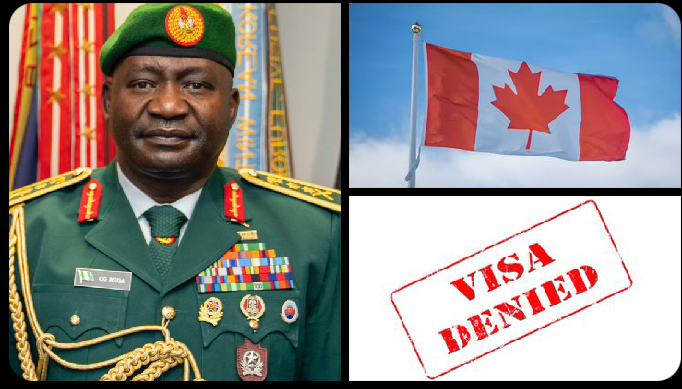Canadian Embassy Denies Visas To Nigerian Defence Chiefs For Official Event.
In a surprising turn of events, the Canadian Embassy has denied visas to Nigeria’s Chief of Defence Staff (CDS), General Christopher Musa, along with other senior military officials, preventing their attendance at an official engagement in Canada.
The delegation had been scheduled to participate in an event honouring war veterans, particularly those injured in battle, recognising the sacrifices made by Nigerian military personnel. However, their travel plans were abruptly halted as several members of the group were refused entry by Canadian authorities.
The news quickly spread on social media platform X, with many Nigerians expressing disappointment and frustration over the decision. The visa denial has sparked widespread reactions, with calls for Nigeria to reinforce its sovereignty and reduce dependence on foreign validation.
National Security Adviser (NSA), Mallam Nuhu Ribadu, was among those who strongly criticised the embassy’s decision. In a statement shared on X, he described the refusal as both “painful” and “disrespectful” to Nigeria’s military leadership. He added, “This is yet another reason we must work hard to make Nigeria work,” underscoring the importance of national self-reliance.

General Musa also commented on the incident, viewing it as a “clear reminder that we must stand strong as a nation and should no longer be taken for granted.” He noted that while half of the delegation had been granted visas, the remaining half was denied, resulting in an incomplete Nigerian presence at the veterans’ ceremony.
The Canadian Embassy has not publicly stated the specific reasons for the visa denials. Such decisions typically involve factors such as the purpose of travel, security concerns, or past travel history. However, this development has raised questions about diplomatic relations and the protocols governing official visits.
In response, the Nigerian government is expected to seek further clarification from the Canadian High Commission. Meanwhile, the incident has intensified discussions about Nigeria’s position on the global stage, with many advocating for a stronger, more autonomous approach to international engagements.
While the situation remains disappointing for the Nigerian delegation, it has also fuelled a broader conversation about the country’s self-sufficiency and diplomatic standing in global affairs.


